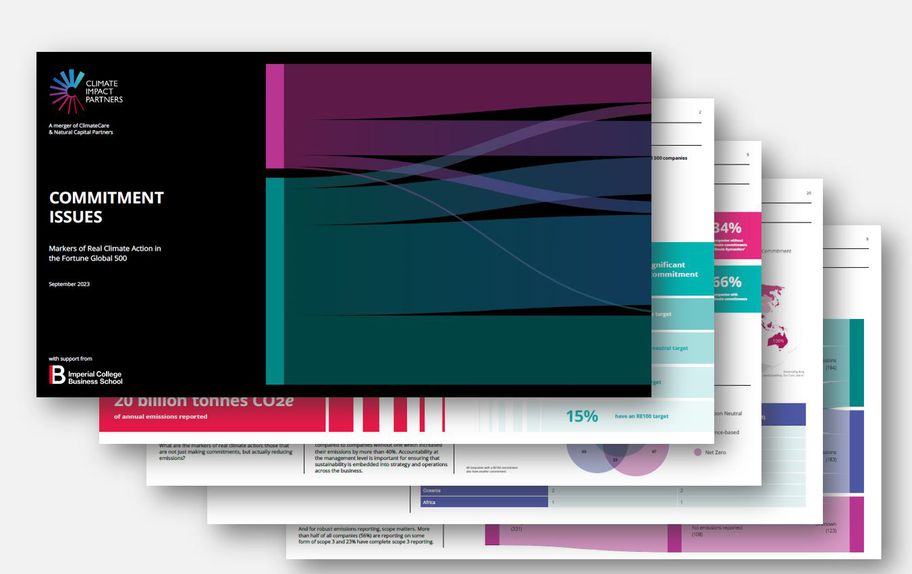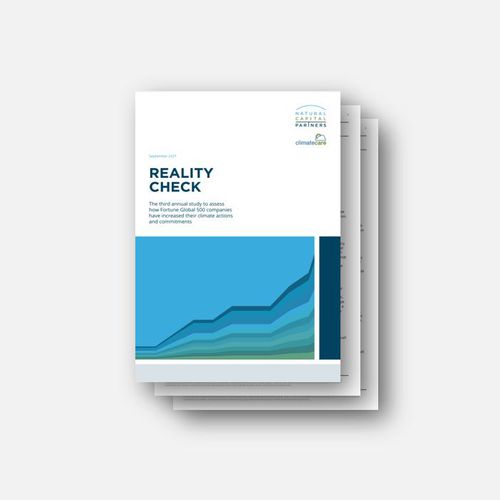Our fifth annual report on the climate commitments of the world’s largest companies explores why climate pledges alone are not delivering enough real, immediate change.
Despite a steady rise in climate commitments following the Paris Agreement in 2015, in the last year the number of Fortune Global 500 companies with a significant climate commitment has stagnated at around 66% of companies.
While commitments are stagnant, emissions are still on the rise. But reducing emissions pays off both environmentally and financially: companies that reduced reported emissions year over year earned on average nearly $1 billion more in profit per company than their Fortune Global 500 peers.
What are the markers of real climate action: those that are not just making commitments, but actually reducing emissions?
1. Reporting emissions
2. Setting a 2030 target
3. Having a Chief Sustainability Officer (CSO)
Explore five charts illustrating the climate action and inaction of the world's largest companies
Despite a steady rise in climate commitments following the Paris Agreement in 2015, in the last year the number of Fortune Global 500 companies with a significant climate commitment has stagnated at around two thirds of companies. To learn more about the annual growth trends of climate commitments among the world's largest companies, download our full report.
Over three quarters of Fortune Global 500 companies are now reporting annual emissions year over year. More than half are reporting on some form of scope 3, and less than a quarter have complete scope 3 reporting. For more data and insights on emission reporting by sector and scope, get your own copy of the full report.
The operational emissions of companies with a 2030 or sooner target reduced by 7% over the last reporting year, compared to a 3% increase among companies without a 2030 target. In this critical decade, emission reductions are what counts. Net zero and carbon neutral are two popular voluntary climate action commitments among Fortune Global 500 companies. See the full report for details on this finding and more.
Nearly half of Fortune Global 500 companies have a Chief Sustainability Officer or equivalent and those companies achieved modest emission reductions as a group over the last reporting year, compared to companies without a CSO that increased emissions in the same period. This still relatively new role is expected to increasingly deliver greater impact. This year our full report includes reflections and advice from Chief Sustainability Officers at a handful of Fortune Global 500 companies.
Hover over each country in the map below to explore how many companies in each country have a significant voluntary climate commitment. For more regional and sector insights, download our fifth annual report.
Who are the Fortune Global 500 companies?
This is our fifth year tracking the growth of climate ambition of the Fortune Global 500, which are the top five hundred largest companies in the world by revenue. In 2022, they earned $41 trillion in total revenue, over one-third of global GDP, and employed more than 70 million people. The Energy Transitions Commission, an international think tank focused on economic growth and climate change mitigation, estimates $3.5 trillion per year of capital investment will be needed to build a net zero global economy by 2050. The Fortune Global 500 earned a total of $2.9 trillion in net profits last year, seemingly giving them the capacity to increase their climate investments and make a meaningful contribution to the global goal.
In addition to the importance of climate action within their own operations, Fortune Global 500 companies have significant influence on their suppliers, customers and the wider world of business and government. The efforts taken by the companies highlighted in this report can provide a benchmark for broader changes in the private sector sustainability landscape. However, the focus on this group does not diminish the value of many other businesses – small, medium, and large – throughout the world, who have also realized the urgency of our climate situation and are already making real change.
PREVIOUS YEARS' REPORTS BELOW:

















